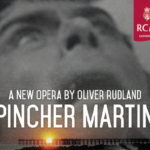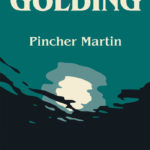Pincher Martin
In Pincher Martin, Christopher Martin has been shipwrecked and is surviving on a rock, in the middle of the Atlantic Ocean. His time on the rock is punctuated by flashbacks of his former life and the disruption in his mind takes a heavy toll. He comes up with a four-point survival plan – one of which is to be careful that he does not go mad.
‘I must watch my mind. I must not let madness steal up on me and take me by surprise. Talking out loud is proof of identity … I must keep my grip on reality.’
However, the horror of being left alone with only his thoughts, and memories of his previous misdeeds, cause Martin to lose his sense of self, and his sanity. He knows he is in danger, and cannot prove his own identity without access to a mirror. The realisation that he may never be rescued causes him to question whether it is better to be mad: ‘Worse than madness? Sanity’.
In showing Christopher Martin’s character in flashbacks, as well as on the rock, Golding is demonstrating that the deterioration of Martin’s mental health is not confined to his present situation. In exposing the actions of Martin pre-disaster, Golding makes us question what it means to be sane. We cannot say that Martin is of sound mind before his accident; indeed, he is deceptive, violent, and misanthropic. He is unable to see this for himself until he is left entirely alone. Martin finally says out loud: ‘Madness would account for everything, wouldn’t it?’
The Spire
Dean Jocelin’s obsession with the construction of the spire turns into madness as the plot develops. Jocelin hallucinates that there is an angel on his back and becomes convinced that this is God’s way of helping him: ‘his angel returned and stood at his back in a cloud of warmth, to comfort him a little’. His frenzied mind makes him believe he has been bewitched by Goody Pangall, and that anything that causes delay to the spire is the work of the devil.
As the weight of the spire literally, and metaphorically, becomes too heavy, Jocelin no longer cares who gets hurt in its construction. He behaves inappropriately for a man in his position, and becomes a laughing stock. Jocelin is eventually called upon to answer for the cost of the spire and the disruption to life in the cathedral. He says: ‘They think I’m mad […] Perhaps I am’. In his final showdown with Roger Mason, Mason tells him: ‘You’re mad. I always thought so’.

